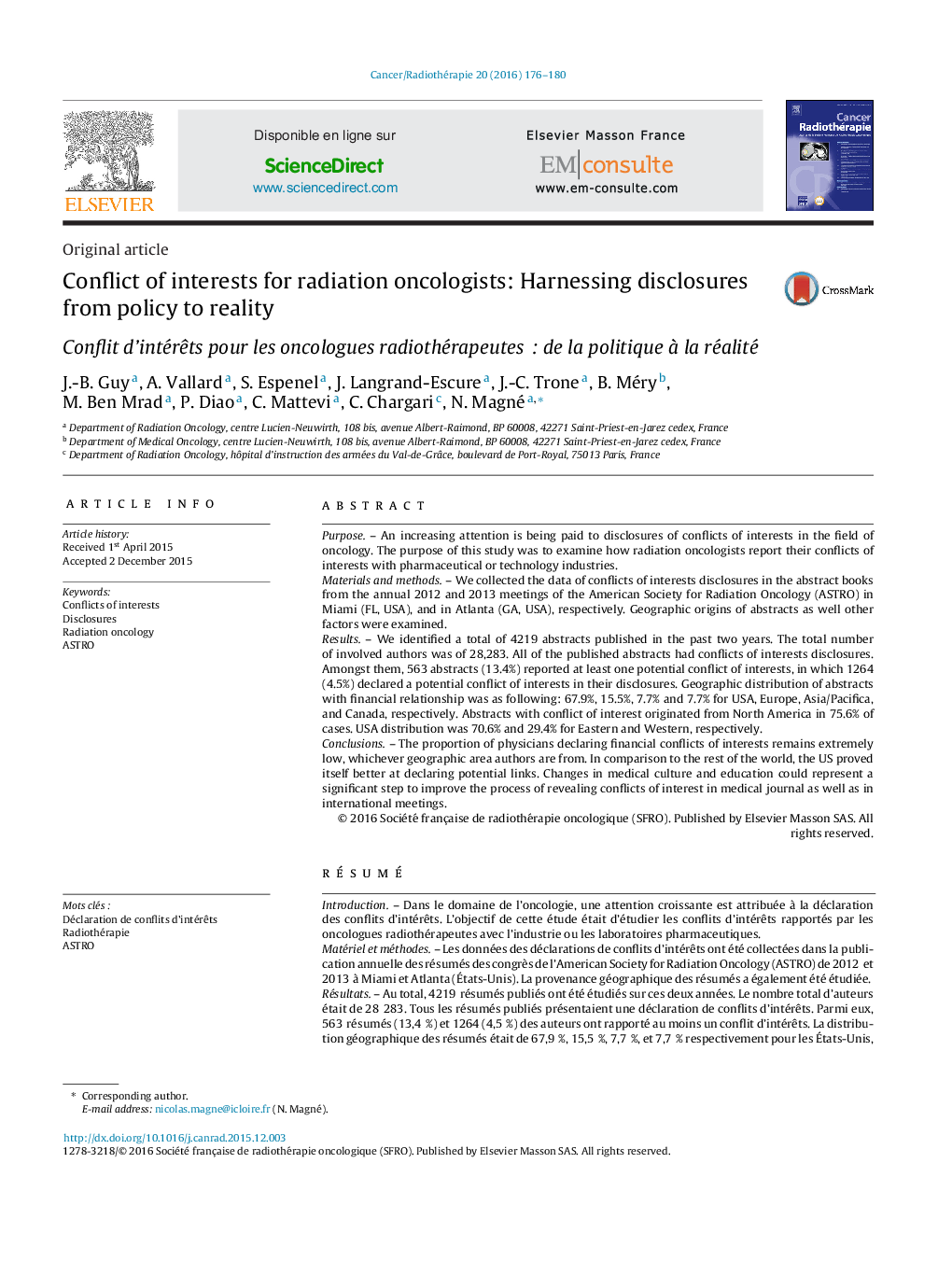| کد مقاله | کد نشریه | سال انتشار | مقاله انگلیسی | نسخه تمام متن |
|---|---|---|---|---|
| 2117230 | 1085196 | 2016 | 5 صفحه PDF | دانلود رایگان |
PurposeAn increasing attention is being paid to disclosures of conflicts of interests in the field of oncology. The purpose of this study was to examine how radiation oncologists report their conflicts of interests with pharmaceutical or technology industries.Materials and methodsWe collected the data of conflicts of interests disclosures in the abstract books from the annual 2012 and 2013 meetings of the American Society for Radiation Oncology (ASTRO) in Miami (FL, USA), and in Atlanta (GA, USA), respectively. Geographic origins of abstracts as well other factors were examined.ResultsWe identified a total of 4219 abstracts published in the past two years. The total number of involved authors was of 28,283. All of the published abstracts had conflicts of interests disclosures. Amongst them, 563 abstracts (13.4%) reported at least one potential conflict of interests, in which 1264 (4.5%) declared a potential conflict of interests in their disclosures. Geographic distribution of abstracts with financial relationship was as following: 67.9%, 15.5%, 7.7% and 7.7% for USA, Europe, Asia/Pacifica, and Canada, respectively. Abstracts with conflict of interest originated from North America in 75.6% of cases. USA distribution was 70.6% and 29.4% for Eastern and Western, respectively.ConclusionsThe proportion of physicians declaring financial conflicts of interests remains extremely low, whichever geographic area authors are from. In comparison to the rest of the world, the US proved itself better at declaring potential links. Changes in medical culture and education could represent a significant step to improve the process of revealing conflicts of interest in medical journal as well as in international meetings.
RésuméIntroductionDans le domaine de l’oncologie, une attention croissante est attribuée à la déclaration des conflits d’intérêts. L’objectif de cette étude était d’étudier les conflits d’intérêts rapportés par les oncologues radiothérapeutes avec l’industrie ou les laboratoires pharmaceutiques.Matériel et méthodesLes données des déclarations de conflits d’intérêts ont été collectées dans la publication annuelle des résumés des congrès de l’American Society for Radiation Oncology (ASTRO) de 2012 et 2013 à Miami et Atlanta (États-Unis). La provenance géographique des résumés a également été étudiée.RésultatsAu total, 4219 résumés publiés ont été étudiés sur ces deux années. Le nombre total d’auteurs était de 28 283. Tous les résumés publiés présentaient une déclaration de conflits d’intérêts. Parmi eux, 563 résumés (13,4 %) et 1264 (4,5 %) des auteurs ont rapporté au moins un conflit d’intérêts. La distribution géographique des résumés était de 67,9 %, 15,5 %, 7,7 %, et 7,7 % respectivement pour les États-Unis, l’Europe, l’Asie, et le Canada. Les résumés présentant des conflits d’intérêts provenaient principalement d’Amérique du Nord (75,6 %). La répartition au sein des États-Unis était de 70,6 % pour l’est et 29,4 % pour l’ouest.ConclusionLe pourcentage de déclarations de conflits d’intérêts chez les médecins reste extrêmement bas, quel que soit leur lieu d’exercice. En comparaison à l’ensemble de la communauté scientifique internationale, les États-Unis ont beaucoup déclaré de conflits. Une prise de conscience est importante dans ce domaine pour faire évoluer la situation et améliorer le processus de déclaration de conflits d’intérêts, aussi bien dans les publications scientifiques que dans les congrès internationaux.
Journal: Cancer/Radiothérapie - Volume 20, Issue 3, May 2016, Pages 176–180
